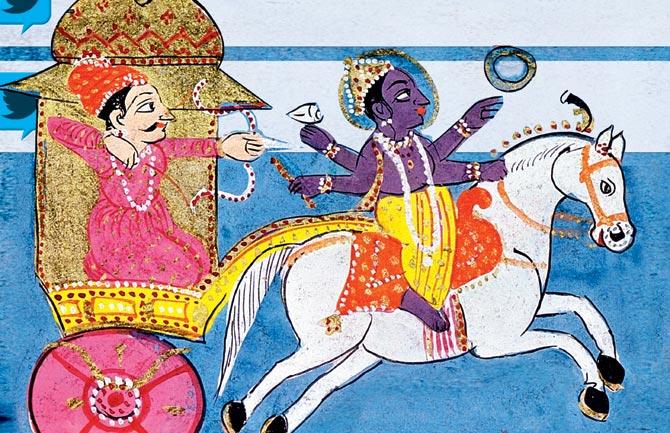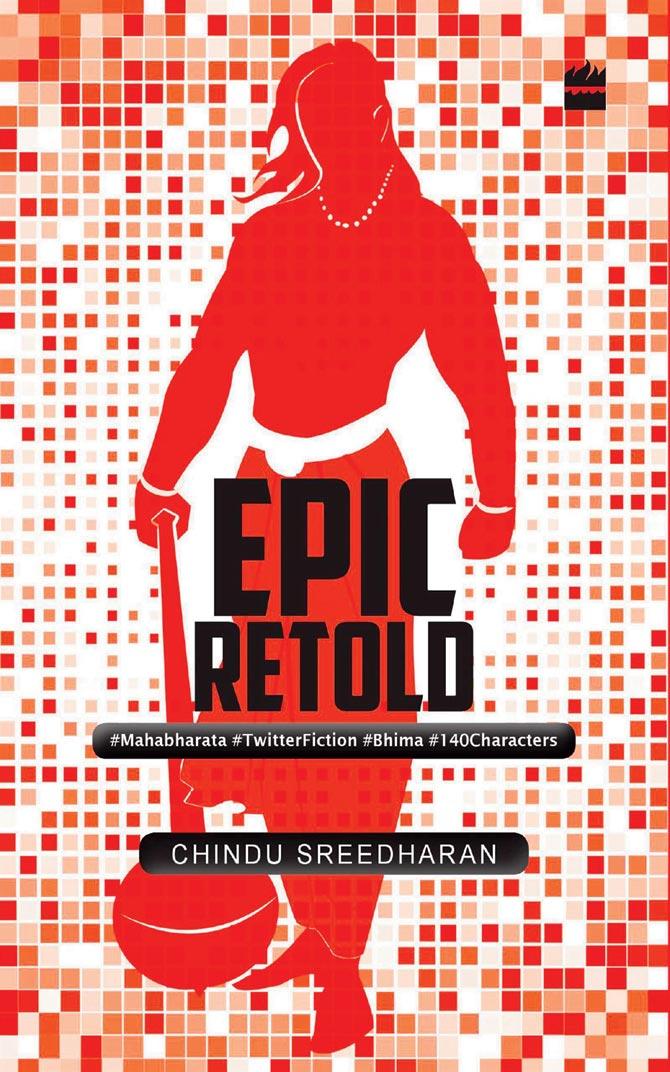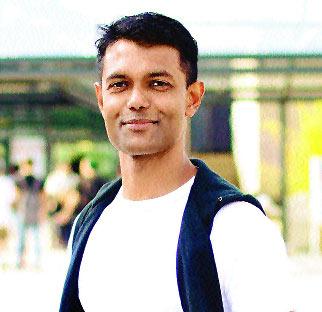Chindu Sreedharan, author of Epic Retold speaks about the challenges of having to share something written for a digital platform back to print

Q. Does The Mahabharata lend itself to a medium like Twitter?
A. It has the plot, the drama, the strong characters and the philosophical richness to appeal to any generation. It is an inexhaustibly rich text, with many layers that allow you to read and retell in different ways. With Epic Retold, I have explored it in a way that would make sense to Twitter audiences.
ADVERTISEMENT

Q. What made you write Epic Retold in the form of tweets?
A. It began as an experiment to see if there was room for a lengthy narrative on Twitter, a platform known for its brevity. This was in the early days of Twitter; there were a few writers tweeting short pieces of fiction on Twitter, and I was curious to see if a novel-length story could be micro-blogged.
Q. Why did you choose Bhima as the protagonist?
A. The logic was that for a retelling on Twitter, you needed a strong protagonist: a reall hero, one who
stands out even amongst the many heroes of Mahabharata. So, the choice was between Arjuna and Bhima. Bhima was a lot less expected, which made him a lot more attractive to me. He had the same dramatic potential as Arjuna, someone with the kind of strength that people admire.

Frieze depicting scene from Mahabharata at Kailasa Temple (Cave 16), at Ellora. Pic/Getty images
Q. What sort of research did it involve?
A. I began this in 2009. So, this was among the first attempts of this nature. Twitter fiction was only emerging and had not even taken on that name. What was out there was mostly ‘Twisters’ — stories told in a single tweet. So there wasn’t much of Twitter fiction to research.
My immediate inspiration in terms of mythology was Bhimsen, published as a blog by a friend, Prem Panicker. This was along the same lines as the Malayalam writer MT Vasudevan Nair’s Randamoozham. That has been a major influence on me ever since I read it as a child. Besides these, I read other versions of The Mahabharata: by SL Bhyrappa, C Rajagopalachari, RK Narayan, and Chitra Banerjee Divakaruni. I also researched historical places, rivers, and forests, though not too painstakingly.
Q. What were the challenges that you faced?
A. The Mahabharata is a complex tale, and I needed to tell it really simply. Any adaptation is a labour of simplification, and with Twitter, with its real-time nature and expectation of breathless urgency in every tweet, the story had to be focused — not only the plot, but the narration, too, which acquired an unusual rhythm, because of the 140-character confines. The pleasure of telling a familiar story is the potential for variations, for reordering and recasting. It’s a different kind of challenge, but very enjoyable. Often, you got an instantaneous response from readers. I was doing this in between a lot of other things, so it was difficult to find a flow. I am grateful to my readers, who kept me on track.
Q. How long did it take you to complete it?
A. I began on July 27, 2009. I finished it by the end of 2013. It took me 1,605 days in all. I am not terribly proud of that!

Q. Has this been attempted before?
A. Not on Twitter. The closest is Prem’s (Panicker) Bhimsen. He blogged it episode-by-episode. There have been a few other books written on Twitter since then. Quite a few authors began later and finished much before I did! Of those, very few have been published as printed books, though. There are many printed books that have been tweeted, but that’s different.

Chindu Sreedharan, Author
Q. Did you wish to make a tech-savvy generation re-look at the epic?
A. I didn’t have a grand plan when I began. I have a job that allows me to experiment with anything that takes my fancy (he’s a Senior Lecturer in Journalism and Communication at Bournemouth University, UK) and at that point, it was an experiment with Twitter. Once I got going, I had to think of the audiences, and I tried to write a story that would be able to make sense to even those who didn’t know The Mahabharata in its original context.
I did have the idea of writing an anti-war story, which The Mahabharata is, in my opinion. Looking back, Epic Retold is a pronounced anti-war story. It is the story of a reluctant warrior, who hated killing; of a prince who lost everything, won it back — and finds he has actually lost everything. It is a Hidimbi-centric story because pretty much everything Bhima does is governed by his love for her.
Excerpt from Epic Retold
This is the beginning of the book. Narrated by a five-year-old Bhima, returning to Hastinapur with Kunti and his brothers, after Pandu’s death.
(Chapter: The Palace, Page 9)
>> I stare at the lady with the black cloth over her eyes. I feel disturbed, scared-but I cannot look away.
>> Pale, beautiful face. Black strip wound tight. Beneath it, the eyes-the eyes with which she would not see. Aunt Gandhari. The queen.
>> She hugs Mother. Then us five. Yudhistira, then me, followed by Arjuna. Then, the twins, Nakula and Sahadeva. Why is she sobbing?
>> ‘Come,’ Aunt Gandhari says. ‘The king is waiting.’
>> She turns. I see the knot of blindfold, black against her grey hair. I stare.
>> I follow with Yudhistira, Mother and the young ones. The palace doors close behind us.
>> So it is true? We are really princes?
 Subscribe today by clicking the link and stay updated with the latest news!" Click here!
Subscribe today by clicking the link and stay updated with the latest news!" Click here!






